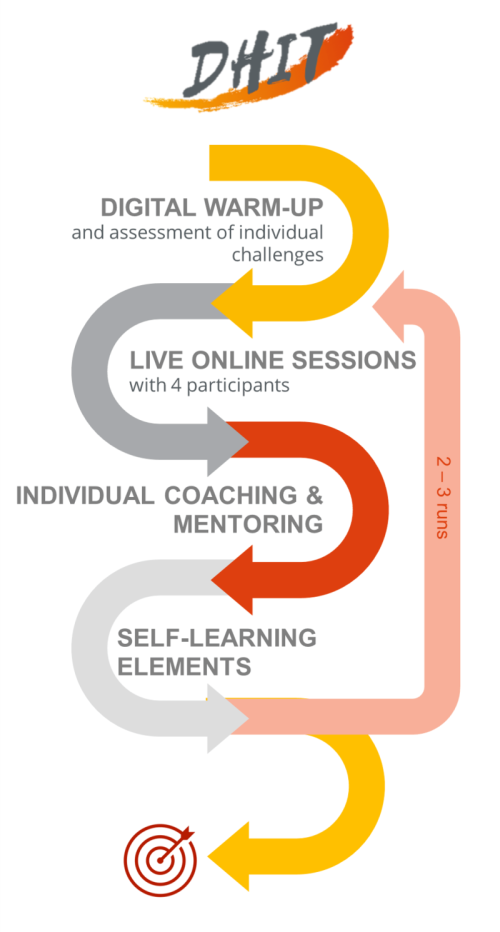Digital High Intensity Training
DHIT®: A strong ME
Take direction and experience sovereignty!
Are you familiar with such situations? You want to give justified criticism to a co-worker, but the well-considered sentence gets stuck in your throat? You feel attacked or treated unfairly and your emotions are running away with you? Do you often have the feeling that you cannot assert your own points of view and interests?

Digital High Intensity Training
DHIT®: A strong ME
Take direction and experience sovereignty!
Are you familiar with such situations? You want to give justified criticism to a co-worker, but the well-considered sentence gets stuck in your throat? You feel attacked or treated unfairly and your emotions are running away with you? Do you often have the feeling that you cannot assert your own points of view and interests?

4 participants
1:1 mentoring
intensive feedback
Sustainable Learning Journey
we work on your own challenges
Your learning goals
- Strengthen your sovereignty
- Clarity about what has so far prevented you from remaining calm in difficult situations
- You will be able to represent your interests in a self-determined and confident manner in the future
- Communicating at the same level as the social environment
Course description
What awaits you in Digital High Intensity Training (DHIT®): A strong ME! Take control and experience sovereignty!
After this training to strengthen your sovereignty, you will have gained clarity about what has so far prevented you from remaining calm in difficult situations and confidently pursuing your own goals. Above all, you will be able to represent your interests in a self-determined and sovereign manner in the future and to act at eye level with your social environment.
In a small group of participants, we offer a protected setting where you deal intensively with your own role in difficult situations and achieve a new understanding of the behavior of other people. Both enable us to develop new behavioral strategies of our own, which – if implemented consistently – lead to the desired change.
Supported by working on individual crucial points in the 1:1 coaching sessions, participants can experience how they can master previously difficult situations with confidence.
Every human behavior, as incomprehensible as it may often seem to us, has good reasons – but we are often not aware of them.
In this training, you will gain a deeper understanding of the causes of your own and others’ behavior by learning about the findings of modern brain and behavioral research. Above all, you will learn to use these insights to consciously control your own behavior, to take control of your own reactions and thus to face previously difficult situations with confidence and composure.
You will learn communication techniques that you can use to respectfully influence the behavior of others – namely behavior that you find difficult – and to initiate desired changes in the interaction with your professional and social environment.
You will learn a highly effective method of mental and emotional self-regulation that will enable you to significantly reduce the high levels of stress you have previously experienced in certain situations.
And last but not least, you will have the exclusive opportunity to receive authentic feedback on concretely experienced behavior and its effects on others in a protected setting and in an appreciative manner.
show lessIn this training, you will gain a deeper understanding of the causes of your own and others’ behavior by learning about the findings of modern brain and behavioral research. Above all, you will learn to use these insights to consciously control your own behavior, to take control of your own reactions and thus to face previously difficult situations with confidence and composure.
You will learn communication techniques that you can use to respectfully influence the behavior of others – namely behavior that you find difficult – and to initiate desired changes in the interaction with your professional and social environment.
You will learn a highly effective method of mental and emotional self-regulation that will enable you to significantly reduce the high levels of stress you have previously experienced in certain situations.
And last but not least, you will have the exclusive opportunity to receive authentic feedback on concretely experienced behavior and its effects on others in a protected setting and in an appreciative manner.
Most important facts about the course
- You will receive compact, scientifically sound basic knowledge on the motivation of human behavior.
- You recognize and understand the causes of your own behavior in situations and contexts that you previously experience as unsatisfactory.
- You receive feedback on how your behavior is perceived and affects others in a protected setting in an appreciative, supportive manner.
- You will learn about the "switching points" for controlling your own reactions and how to use the knowledge about them.
- You learn to clearly communicate and represent your own needs and interests.
- With the "Constating Attentive Awareness (KAW)" you will learn a method of mental and emotional self-regulation that is easy to apply in your everyday life and leads to significant stress reduction in previously stressful situations.
Process of the Digital High Intensity Trainings®

Learning Journey
- 1.5 hours warm-up session
- 3x3 hours of highly intensive and interactive live online sessions in small groups with max. 4 participants at intervals of approx. 3 weeks
- 3 individual 45 minute coaching sessions with your trainer following the live online sessions to support a successful transfer into individual practice
- Self-study elements between the sessions to further support the learning process (time required approx. 3 hrs. in total)
All dates
07.10.2024
10:00 - 11:30
Live Online Session: Warm-Up
MS Teams
14.10.2024
09:00 - 12:00
Live Online Session: Module 1
MS Teams
04.11.2024
09:00 - 12:00
Live Online Session: Module 2
MS Teams
25.11.2024
09:00 - 12:00
Live Online Session: Module 3
MS Teams
07.10.2024
10:00 - 11:30
Live Online Session: Warm-Up
MS Teams
14.10.2024
09:00 - 12:00
Live Online Session: Module 1
MS Teams
04.11.2024
09:00 - 12:00
Live Online Session: Module 2
MS Teams
25.11.2024
09:00 - 12:00
Live Online Session: Module 3
MS Teams
Your Contact Person
Our experts will be pleased to advise you!


Your Contact Person
Our experts will be pleased to advise you!
DHIT®: A strong YOU! Take direction and experience sovereignty! - Questions and answers
First of all it is important to clarify exactly what my interests actually are! Only when there is inner clarity about this can I also communicate clearly to the outside world and thus ensure that my counterpart knows my interests as well.
And I have to be worthy of representing my interests myself. If I don’t value myself and my needs, how can someone else?
First of all, it is about finding out what makes me act not sovereign in certain situations. These are mainly rather internal, than external factors, even if we often think that others are responsible for the fact that we do not feel sovereign. Once the cause is identified, I can either resolve it (there are different methods for this) or develop alternative reaction strategies.
We are human beings and therefore fortunately able to react emotionally. Therefore, it is worth thinking about what we mean by an “overly emotional” reaction. By expressing our emotions, we establish a relationship, we become visible and assessable. If it is rather a matter of inappropriate emotional reactions in the sense of: “The reaction is not appropriate to the concrete occasion”, self-reflection is first necessary to avoid such a reaction. What makes me react so violently in this situation? What old burdens am I perhaps still plaguing myself with that are being reactivated? Even clarity about this helps to distinguish in new situations which emotion actually belongs there and to regulate the level.
First of all it is important to clarify exactly what my interests actually are! Only when there is inner clarity about this can I also communicate clearly to the outside world and thus ensure that my counterpart knows my interests as well.
And I have to be worthy of representing my interests myself. If I don’t value myself and my needs, how can someone else?
First of all, it is about finding out what makes me act not sovereign in certain situations. These are mainly rather internal, than external factors, even if we often think that others are responsible for the fact that we do not feel sovereign. Once the cause is identified, I can either resolve it (there are different methods for this) or develop alternative reaction strategies.
We are human beings and therefore fortunately able to react emotionally. Therefore, it is worth thinking about what we mean by an “overly emotional” reaction. By expressing our emotions, we establish a relationship, we become visible and assessable. If it is rather a matter of inappropriate emotional reactions in the sense of: “The reaction is not appropriate to the concrete occasion”, self-reflection is first necessary to avoid such a reaction. What makes me react so violently in this situation? What old burdens am I perhaps still plaguing myself with that are being reactivated? Even clarity about this helps to distinguish in new situations which emotion actually belongs there and to regulate the level.


